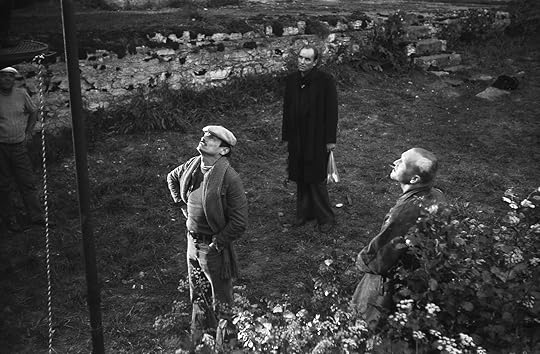Lars Iyer's Blog, page 28
September 1, 2016
Out now - the manifesto in French:
Reviewed on radio. ...
Out now - the manifesto in French:
A reminder that this exists:
July 22, 2016
One cannot emphasise enough just how crucial was the mass...
One cannot emphasise enough just how crucial was the mass domestication of the car, ensuring the transition from what might be called 'traditional solidarities' to the unprecedented unleashing of modern individualism. What does it matter if the car kills, pollutes, and often makes people into total jerks, its proliferation destroying every urban space worthy of the name, when what is at stake is to ensure the domestication of gigantic human masses, the forging of thousands of psychologies of average men on wheels, 'highway mentalities', aping day and night the fluidities and competition of the Great market, etching it into the landscape ....?
Gilles Chatelet, To Live and Think Like Pigs
July 15, 2016
RG: My answer here is quite simple. I tend to write in a ...
RG: My answer here is quite simple. I tend to write in a condensed form: in fragments, in aphorisms, in blocks. For this kind of work you have to be prepared, you have to have certain ideas of what you expect to say (the ���necessity��� element). But then, suddenly, you get inspired, and you are able to ���realize��� your work ���immediately,��� you are able to place the right words in the right time, like in music. That���s the second phase, the writing itself. The third phase is when you already have enough material, and you can ���play��� with it to gradually shape the final structure into which it all fits.
FG: So you���re delineating three steps in your process: preparation, writing/work, and play. Play coming last might surprise some people. Which step is the most difficult for you? How do you deal with that difficulty?
RG: The most difficult is writing itself���what is before it is not too far from what is after it. In that sense there is an ���ecstatic element��� in what I write. And because we can���t experience the ecstatic perpetually, we need to be prepared for it���so later it would help us to recognize what had happened ���inside��� of it. Meanings are usually inherent to what is written, but not always. When they are not, you have to find the ���secondary inherencies��� by structuring the whole material anew. That���s play. But that���s work at the same time.
Interview with R��bert G��l
July 11, 2016
INTERVIEWER
This sounds very pessimistic and hopeless an...
INTERVIEWER
This sounds very pessimistic and hopeless and seems at variance with your mystical and religious tendencies.
IONESCO
Well, there is a higher order, but man can separate himself from it because he is free���which is what we have done. We have lost the sense of this higher order, and things will get worse and worse, culminating perhaps in a nuclear holocaust���the destruction predicted in the Apocalyptic texts. Only our apocalypse will be absurd and ridiculous because it will not be related to any transcendence. Modern man is a puppet, a jumping jack. You know, the Cathars [a Christian sect of the later Middle Ages] believed that the world was not created by God but by a demon who had stolen a few technological secrets from Him and made this world���which is why it doesn���t work. I don���t share this heresy. I���m too afraid! But I put it in a play called This Extraordinary Brothel, in which the protagonist doesn���t talk at all. There is a revolution, everybody kills everybody else, and he doesn���t understand. But at the very end, he speaks for the first time. He points his finger towards the sky and shakes it at God, saying, ���You rogue! You little rogue!��� and he bursts out laughing. He understands that the world is an enormous farce, a canular played by God against man, and that he has to play God���s game and laugh about it. That is why I prefer the phrase ���theater of derision,��� which Emmanuel Jacquart used for the title of his book on Beckett, Adamov, and myself, to ���theater of the absurd.���
Ionesco, interviewed
To walk about London on a Sunday with nowhere to go - tha...
To walk about London on a Sunday with nowhere to go - that will take the heart out of you.
Whatever you do, don't be gloomy, because that gets on people's nerves.
And don't write about anything you know, for then you get excited and say too much, and that gets under their skins too.
At lunch she drank a half-bottle of Burgundy and felt very hopeful.
I've had rather a rum life, but I was thinking the other day, would I go through it all again? I think not.
I like the man who wrote From Russia With Love... Ian Fleming. He's one who can take you away from everything if you're bored and sad.
No more pawings, no more pryings - leave me alone. ...
I hate the whole bloody business. It���s cruel, it���s idiotic, it���s unspeakably horrible.
I didn't ask to be born; I didn't make the world as it is; I didn't make myself as I am; I am not one of the guilty ones.
One day the fierce wolf that walks by my side will spring on you and rip your abominable guts out.
I was always happy in the morning, not always in the afternoon and never after sunset.
I'll bet my tears are ninety per cent gin.
I don't feel well. I don't feel up to it. My clothes are too shabby.
You know what you must do in your writing. You must tell the truth about them. You must tell the truth against their lies.
'Smile please,' the man said. 'Not quite so serious.'
When my first love affair came to an end I wrote this poem: I didn't know/ I didn't know/ I didn't know. Then I settled down to be miserable.
I am always being told that until my work ceases being "sordid and depressing" I haven't much chance of selling.
Haven't touched a drop for a month. Won't it be fine when I do.
Yesterday at the cinema in the one and threes, watching the usual thing. Biff. Bang. Why, you dirty double-crossing. Bang. Biff.
Don't listen to what I say. Don't listen to me, I'll depress you.
I want a long, calm book about people with large incomes - a book like a flat green meadow and the sheep feeding in it.
I wish I were old and the whole damned thing were finished; then I shouldn't get this depressed feeling for nothing at all.
Justice. I've heard that word. I tried it out. I wrote it down. I wrote it down several times and always it looked like a damn cold lie.
Let's have more drinks, honey.
Detestable world.
'Oh, shut up about being tired,' she would say. 'You were born tired. I'm tired too. We're all tired.'
Save me from destruction, ruin and desolation. Save me from the long slow death by ants.
I'd never get into the sacred circle. I was always outside, shivering.
One is born either to go with or to go against.
'Obscene drawings on the tablecloth are not allowed here,' the waiter said as he approached.
Do you believe in God? I do not know. In human love? Yes. Still? Yes. In humanity? No.
There's very little invention in my books. What came first was the wish to get rid of this awful sadness that weighed me down.
His name was Disastrous because his godmother thought it such a pretty word.
'Quite like old times,' the room says. 'Yes? No?'
I'm over eighty. Look at me. And what have I done? Nothing! Nothing! Mediocrity. Mediocre, that's what my work is.
The mean things they got away with - sailed away with - smirking.
The estate house had been empty for so long that a centipede fell out of a book when I opened it.
Oh, God, I'm only twenty and I'll have to go on living and living and living.
So many people think I don't exist that sometimes I ask myself if I do.
I am alive I think. Not at all sure sometimes, and waving not drowning.
I feel it's very tactless of me to be alive. No savoir faire. (Damn little savoir vivre either)
Save me from destruction, ruin and desolation. Save me from the long slow death by ants.
I do believe that life's all laid out for one. One's choices don't matter much.
You'd pine to death if you hadn't someone to look down on and insult.
Oh God the stupidity, the ugliness, the darkness, the loneliness and the cruelty of this beastly little place.
Drama is catching, I find.
You look very perky, I hardly recognised you.
It's so cold in this damn place that I can't think of anything except how cold I am and cold in general and that cold is hell.
'Obscene drawings on the tablecloth are not allowed here,' the waiter said as he approached.
I am trying to stop hope growing again like the beanstalk.
I am tired. I learnt everything too late. Everything was always one jump ahead of me.
The trouble is I have plenty to say. Not only that but I am bound to say it.
Tears? There's not a tear in her.
The unutterably sweet peace of giving in.
It is cold and dark outside, and everything has gone out of me except misery.
I sat and I looked about and I thought: Why do I hate people? They're not hateful.
From Jean Rhys, various writings, various characters, via.
from the set of Tarkovsky's Stalker.
July 3, 2016
... under wage-labor, nihilism has entered production. It...
... under wage-labor, nihilism has entered production. It is no longer a question of modernization producing rootlessness, contingency, uncertainty, anomie as side effects of a rational core. Rather, productive activity uses those very effects as resources. ���Nihilism, once hidden in the shadow of technical-productive power, becomes a fundamental ingredient of that power, a quality highly prized by the marketplace of labor.��� (GM86) The result is the affective prevalence of opportunism and cynicism. The post-Fordist worker moves from one thing to another; negotiating rules of the game, responding to rules not facts. Money makes these things equivalent; the general intellect is always something else. It is a qualitative potential that forms the basis of all production.
McKenzie Wark on Paolo Virno
June 30, 2016
Lars Iyer's Blog
- Lars Iyer's profile
- 98 followers









